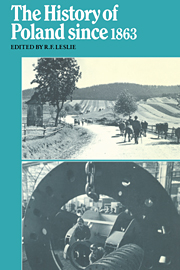Book contents
- Frontmatter
- Contents
- List of maps
- Preface to the paperback edition
- Abbreviations
- Map 1 Poland in the nineteenth century
- 1 Triloyalism and the national revival
- 2 Poland and the crisis of 1900–7
- 3 Poland on the eve of the First World War
- 4 The emergence of an independent Polish state
- 5 The breakdown of parliamentary government
- 6 Piłsudski in power, 1926–35
- 7 Poland without Piłsudski
- 8 Poland in defeat, September 1939–July 1941
- 9 The ill-fated alliance, August 1941–April 1943
- 10 The years of Tempest, May 1943–December 1944
- 11 Post-war Poland
- 12 The rise and ebb of stalinism
- 13 The October turning point
- 14 ‘The little stabilization’
- 15 The decline of Gomułka
- 16 Poland under Gierek
- 17 Polish society, 1945–75
- Epilogue: The rise and fall of Solidarity
- Notes
- Select bibliography
- Index
11 - Post-war Poland
Published online by Cambridge University Press: 26 December 2009
- Frontmatter
- Contents
- List of maps
- Preface to the paperback edition
- Abbreviations
- Map 1 Poland in the nineteenth century
- 1 Triloyalism and the national revival
- 2 Poland and the crisis of 1900–7
- 3 Poland on the eve of the First World War
- 4 The emergence of an independent Polish state
- 5 The breakdown of parliamentary government
- 6 Piłsudski in power, 1926–35
- 7 Poland without Piłsudski
- 8 Poland in defeat, September 1939–July 1941
- 9 The ill-fated alliance, August 1941–April 1943
- 10 The years of Tempest, May 1943–December 1944
- 11 Post-war Poland
- 12 The rise and ebb of stalinism
- 13 The October turning point
- 14 ‘The little stabilization’
- 15 The decline of Gomułka
- 16 Poland under Gierek
- 17 Polish society, 1945–75
- Epilogue: The rise and fall of Solidarity
- Notes
- Select bibliography
- Index
Summary
The formation of the Provisional Government of National Unity
On 12 January 1945 forces of the First Ukrainian Front followed by the Third Byelorussian Front and then the First and Second Byelorussian Fronts and finally the Fourth Ukrainian Front opened a gigantic offensive which in the course of a few weeks was to liberate the rest of Poland. To the soldiers of the Polish First Army fell the honour of liberating Warsaw on 17 January. By the spring of 1945 the Polish armies amounted to 400,000 men, a not inconsiderable achievement in so short a time and a valuable contribution to the conclusion of hostilities. By the middle of March the provisional government was in control of what was to become post-war Poland. The communists, supported by the Red Army, began the task of rebuilding national life, whereas the pro-London forces were in a state of near collapse. The presence of Soviet military forces in the country meant that they were powerless to act. Indeed, by October 1944 Stalin had told the PKWN that the Soviet forces themselves would suppress AK activity, which they saw as a threat to their rear. He assured the Committee that the unity of the Grand Alliance would not suffer as a result of differences between the Western Allies and the Soviet Union with regard to Poland. He even criticized them for their lack of ‘revolutionary methods’ in dealing with their opponents. As a result the PKWN began a virulent campaign against the AK. The conflict between the anti-communist forces and the provisional government created conditions of civil war.
- Type
- Chapter
- Information
- The History of Poland Since 1863 , pp. 280 - 298Publisher: Cambridge University PressPrint publication year: 1980



